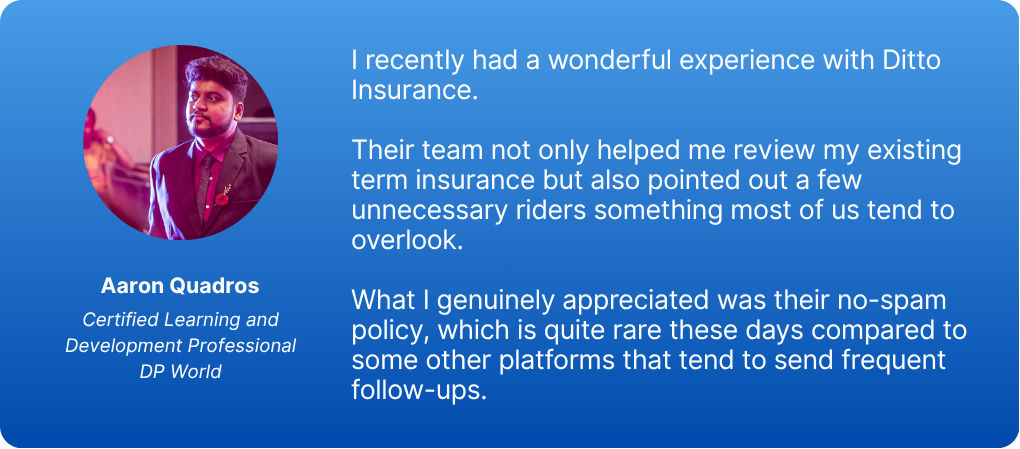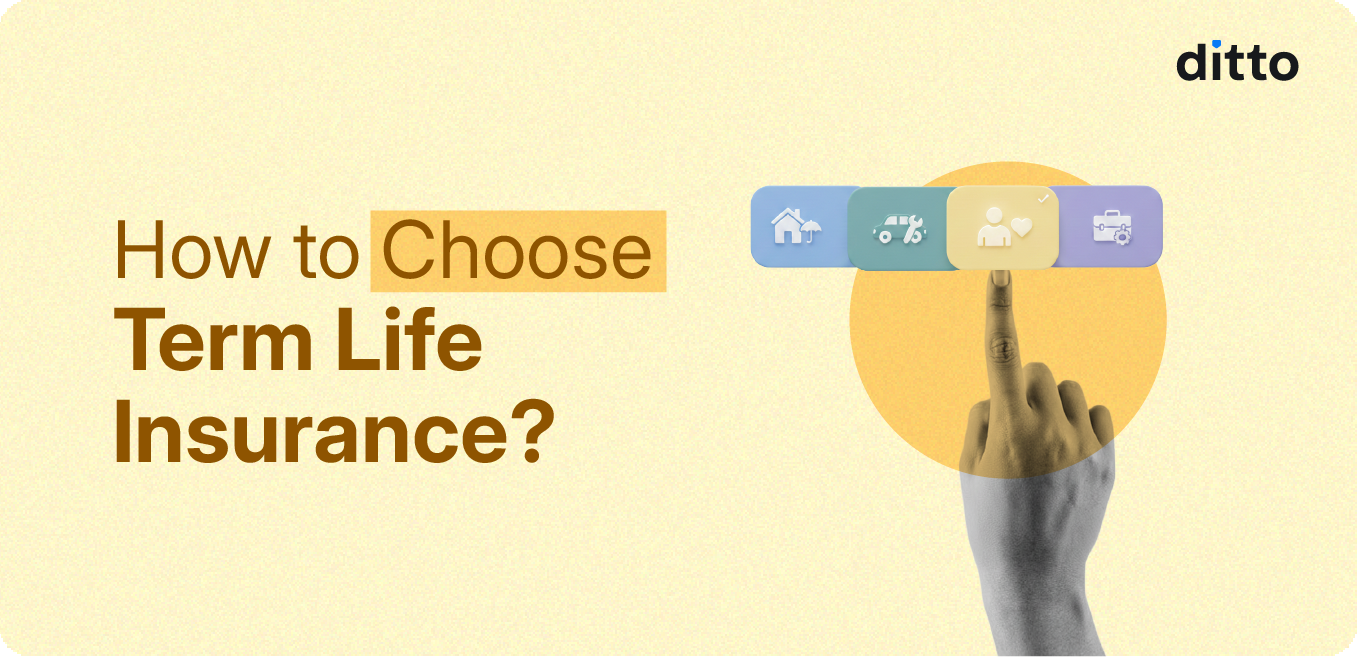Quick Overview
When you are buying term insurance, the process can feel complicated because of too many insurers, complex policy wordings, and the fear of making the wrong choice.
At Ditto, we’ve simplified insurance for lakhs of customers and helped them choose the right term plan based on data, not sales pitches.
After carefully reviewing IRDAI guidelines, insurer disclosures, and policy prospectuses, we’ve put together this practical guide on how to choose term life insurance.
Let’s break down the most important factors you should consider, starting with selecting the right insurer.
How to Choose the Right Term Life Insurer?
Your insurer’s reliability matters as much as the policy itself. Evaluate insurers using the following key metrics:
1) Claim Settlement Ratio
- The Claim Settlement Ratio shows the percentage of claims an insurer has settled out of the total claims received in a financial year.
- A CSR of 97% or above is generally considered strong and indicates a high likelihood of claims being settled.
- For Example, Axis Max Life reported a CSR of 99.62% (Average of FY 2022-25), ranking among the top insurers.
2) Amount Settlement Ratio
- The Amount Settlement Ratio indicates the percentage of the total claim amount paid by the insurer.
- In term insurance, claims are either fully accepted or rejected, and there are no partial settlements, making this metric slightly important.
- An ASR of above 90% is considered good, as it shows whether an insurer is settling both low and high value claims fairly.
- Axis Max Life leads in the current term insurance market with an ASR of 96.2% (FY 2022-25 Average).
3) Solvency Ratio
- The solvency ratio reflects an insurer’s financial health and its ability to meet long-term obligations.
- IRDAI recommends a minimum solvency ratio of 1.5, and anything above 1.8 is generally considered comfortable.
- For example, Bajaj Life (4.37, an average of FY22-25) has the highest solvency ratio among life insurers.
4) Complaint Volume
- This shows how many complaints an insurer receives per 10,000 claims.
- A lower complaint volume indicates better customer experience and smoother claims
- For example, HDFC Life has one of the lowest complaint volumes at 1.33 per 10,000 claims (FY 2022-25 average).
5) Annual Business Volume and Amount Paid in Claims
- This indicates how much new business the insurer writes each year and how much it pays out in claims.
- It’s an important factor to consider because large business volumes and high claim payouts show scale, experience, and operational maturity.
- For example, LIC has the highest annual business volume of ₹2,27,169 (Average of FY 22-25)
If you need further help, you can check out our list of the top 5 term insurance companies in India.
How to Choose a Term Life Insurance Policy?
Once you shortlist a reliable insurer, the next step is choosing the right policy structure.
1) Consider Your Current Lifestyle
Your cover should reflect your lifestyle and not just your income. Consider the number of your dependents, outstanding uninsured loans (home loan, car, personal, etc.), monthly expenses, future goals (children’s education, spouse’s retirement, etc.), and inflation.
If you need help, you can also check out the cover calculator tool on our website.
2) Add-Ons/Riders Available
Riders enhance your base policy and offer extra protection. At Ditto, we typically recommend the Critical Illness (CI), Waiver of Premium (WoP), Terminal Illness (TI), and Accidental Total and Permanent Disability riders (ATPD).
However, every profile can be different, so choose only those riders that add real value and don’t just overload your policy because the riders are available.
3) Premium Cost
The cheapest plan isn’t always the best when it comes to term insurance. You should check and compare premiums across insurers by considering the coverage amount, policy term, and riders.
Let’s consider an example of healthy, non-smoking profiles, covered for a sum assured of ₹2 crores till the age of 65:
Note: The premiums do not include any discounts and are indicative in nature. For up-to-date premiums, refer to the insurer’s website or reach out to us.
In term insurance, the premiums get locked once you buy the policy. Moreover, as you can see from the table, the premiums rise steeply with age. Therefore, it’s recommended to buy term insurance as soon as possible.
4) Policy Term
The policy term is the duration for which your life will be covered. Generally, your coverage should last till your dependents become independent and all your financial responsibilities are over. You can consider a policy term till the age of 65-70.
5) Premium Payment Term
Most insurers offer three common options:
- Regular Pay: You pay premiums every year throughout the policy term (for example, paying till age 65).
- Limited Pay: You pay premiums for a shorter duration (such as 10, 15, or 20 years), while the coverage continues for the full policy term.
- Single Pay: You pay the entire premium upfront in one go.
For more details on which one to choose for yourself, you can check out our detailed guide on premium payment terms.
6) Payout Options
Most insurers offer multiple payout options such as lump sum payout, monthly income, or a combination of both. Choose the one that works best for you.
If you need further help, you can check out our list of the best term insurance plans in India, or check out the attached video.
Why Choose Ditto for Term Insurance?
At Ditto, we’ve assisted over 8,00,000 customers with choosing the right insurance policy. Why customers like Aaron below love us:

- No-Spam & No Salesmen
- Rated 4.9/5 on Google Reviews by 15,000+ happy customers
- Backed by Zerodha
- 100% Free Consultation
You can book a FREE consultation. Slots are running out, so make sure you book a call or chat on WhatsApp now!
Conclusion
Choosing the right term life insurance isn’t about picking the most popular insurer or the cheapest premium. It’s about selecting a financially stable insurer and a policy that truly protects your family’s future.
By focusing on the right metrics, understanding your lifestyle needs, and avoiding unnecessary add-ons, you can make a confident and informed decision. If you ever feel stuck, Ditto is always here to help you make your decision.
Frequently Asked Questions
Last updated on:










